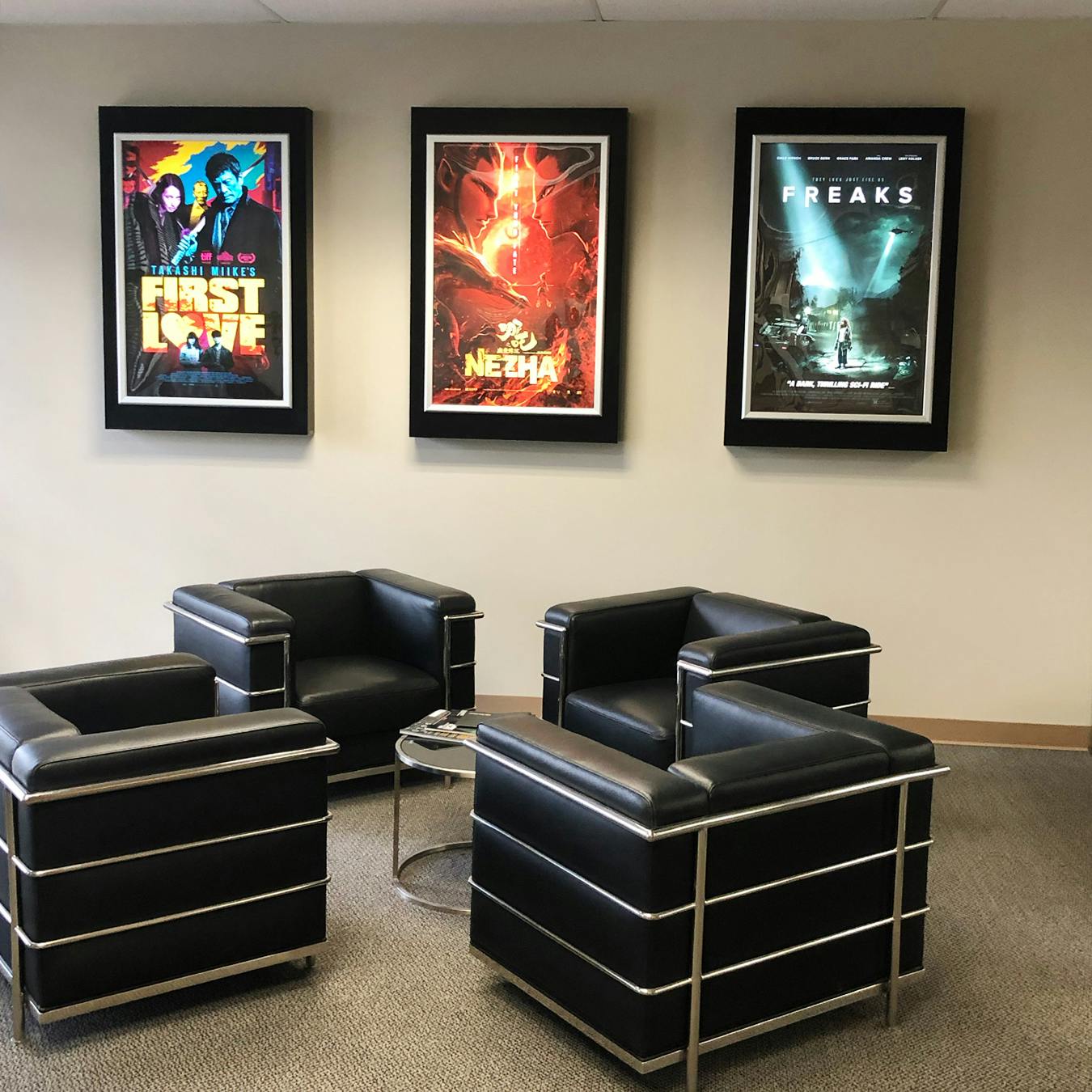Every Friday the 13th deserves its terrifying theatrical release. 2019 had Freaks. Set in the near-future, this slow burn sci-fi film tells the claustrophobic story of seven-year-old Chloe (played by Lexy Kolker), a child largely shielded from the outside world by her paranoid, protective father (Emile Hirsch). Chloe’s dad is afraid of the Abnormals, a group of humans turned into mutants after a global catastrophe. And since Abnormals are being hunted down in the streets by the government, Chloe doesn’t get out much. But when she encounters a mysterious stranger (Bruce Dern) just outside her front door, things get more complicated.
Freaks came at the behest of a group of film aficionados in Plano. They run Well Go USA, the unassuming company and former karaoke video hub that now happens to distribute genre films like Freaks, and is a leading force in bringing Asian action cinema to the United States.
The corporate office of Well Go USA doesn’t look much different from the many HQ outposts in present-day Plano, where giants from Pizza Hut to Hewlett Packard boast corporate homes. The city’s proximity to a major airport and abundance of affordable space have made it something of a business destination (Plano’s Economic Development Office reported nearly one million square feet of new corporate offices in 2018 alone). While Well Go USA didn’t start as anything resembling Pizza Hut or Bank of America, this family business has quietly grown into a Hollywood stalwart over the past thirty years. Today, their own beige building hosts films that have competed for some of the most prestigious awards in film, in Cannes and California alike.
CEO Doris Pfardrescher and CFO/COO Dennis Walker represent the second generation to run the film distributor started by their mother, Annie Walker, back in 1989 after the family moved to North Texas from Taiwan. Back then, Annie Walker arrived in Texas for a regional manager opportunity with Fendi Timepieces in Dallas. She quickly tired of corporate life, and wanted to work for herself instead. Many of Walker’s relatives in Taiwan had worked in film—Doris and Dennis’ grandfather was a cinematographer, their uncle an actor, and their cousin a manager. But Annie Walker just set out to do something different, Dennis Walker recalls.
Originally, the family business had smaller ambitions. “[My mother] started by importing karaoke laser discs—because my uncle produced and made them in Taiwan,” Pfardrescher says. “It was the kind of video with a girl walking through the field, with the lyrics at the bottom. She’d import them to the U.S. and sell them to little mom-and-pop Asian video stores.”
That foray into the karaoke business took off for a while. Walker initially operated it out of their home; Dennis Walker recalls plenty of busy afternoons packing and shipping laser discs alongside his dad in the family garage-turned-warehouse. Pfardrescher attended SMU in Dallas, and upon graduating in 1994, she came on full time thinking it’d be something to do until she figured out her real career. With the extra full-time staff (at least for the moment), Annie Walker officially incorporated her laser-disc company that year.
“[Mom and Dad] needed to come up with a name—we only had a Chinese name for the company, not an English name,” Dennis Walker recalls. “The logo that was being used was basically a singing dog—a dog in a top hat with a microphone, that was the logo. In Chinese, the name for that is hui guo [which sounds a bit like “way go”]. So when trying to come up with an English name, my mom interpreted the hui guo as ‘Well Go.’”
Following the name change, said uncle in Taiwan started wondering if Well Go would also be interested in acquiring movies or TV shows to distribute there. So, as Pfardrescher puts it, suddenly they started working with companies like ABC and CBS and “having no idea what we’re doing, but we figured it out.” For a while Well Go would acquire a license, their uncle had a distributor lined up in Taiwan, and this entertainment would eventually make it to audiences abroad. But the arrangement didn’t last long—Well Go’s Taiwanese distributor went under not too long into their new endeavor.
“We were stuck with all the rights and contracts to these programs, so we decided, ‘Let’s just do it ourselves,’” Pfardrescher says. “‘Let’s see if we can distribute these over in Taiwan.’ And once that gained a little momentum, we said, ‘Hey, let’s try it in the U.S.’”
In the mid-2000s, Well Go started the film-specific work that would become the foundation for what the company does today. Since they already had experience packaging and shipping discs, Well Go initially targeted straight-to-video programming. “The first one we did was a David Leadbetter Golf Instruction DVD, and somehow we got it into Walmart,” Pfardrescher says. “It was a huge order, so it was literally all of us plus a couple of employees packing, creating DVDs, and shipping them out to Walmart. Now suddenly we needed to feed the pipeline, so we tried everything: B horror movies, B movies in general, kids’ programs, pilates and yoga DVDs …”
While the company’s straight-to-video work was robust enough to sustain their growth in the early 2000s, they noticed the landscape changing: DVDs were becoming less important, and video on demand was surging. There was also a very noticeable underserved market at the cinema: people wanting Asian action movies.

At the time, major studios would release big-budget Asian action films—say, 2000’s Crouching Tiger, Hidden Dragon or 2006’s Fearless—seldomly. But major distributors were skipping the biggest films coming out of Asia to work on genres with longer U.S. track records, such as summer blockbusters, franchises, rom-coms, and comedies. But around 2008, Well Go had the opportunity to distribute the film Ip Man, a biopic about the martial arts master whose students included Bruce Lee. While Ip Man had yet to arrive in the U.S., it already had a sequel in the works—so they jumped on it.
“We signed over our lives and bought the rights—that was one of our first films where we really thought about theatrical distribution,” Pfardrescher says. “It was a huge hit, especially on home entertainment, and VOD was starting to pick up at that time, so our company expanded so quickly after that. We saw a hole that needed to be filled and went for it, and that expanded us into a company that focused on the Asian action genre for a long time.”
For the next several years, Well Go maintained a pretty narrow focus on Asian action cinema and built up an industry-wide reputation. Well Go employees soon began programming and appearing on judge’s panels at various Asian cinema or genre-centric film festivals both in and out of state. On the rare instances Well Go worked with films outside of this focus, they gravitated toward work that overlapped with the interests of many action film fans, such as a documentary about Marvel’s Stan Lee (2010’s With Great Power) and 2013’s Zombie Hunter, starring Danny Trejo.
Under Pfardrescher and Walker’s leadership (they took over in 2014), the definition of what makes a Well Go project has expanded in incremental ways. The distributor has started embracing documentaries a bit more—they worked on titles like 2015’s Sweethearts of the Gridiron, about the Kilgore College Rangerettes, and 2019’s Another Shot, about former NBA player Stephon Marbury’s second career in China. They’ve guided a few star-centric indie films, such as 2017’s Mine (a military flick starring Armie Hammer right before he stole hearts in Call Me By Your Name) and 2017’s Buster’s Mal Heart (one of Rami Malek’s last roles before winning the Best Actor Oscar for Bohemian Rhapsody). Well Go has embraced horror to great effect, too, with cult hits like the 2016 film Train to Busan and the Phantasm series (for which Well Go worked on both the remastering of the 1979 original and the release push for the 2016 sequel).
So while the Plano-based company remains the leading distributor of Asian action cinema in the United States, their body of work in the last few years also starts to resemble other beloved modern arthouse distributors like A24 (the company behind everything from Lady Bird to Hereditary) or NEON (founded by Alamo Drafthouse’s Tim League, it has distributed I, Tonya and the recent Apollo 11 documentary, among others). And like those two, Well Go has even started dabbling in production, with hopes to grow that part of the business in the coming years.
While it’s no longer run from a home office, Well Go’s job as a distributor hasn’t changed much since 1989. The company acquires the rights to a product, and it sells that to retail stores or other consumer-facing companies (back then, karaoke videos with the girl walking through the field; today, films). Even in 2019, Well Go packages, ships, and sells plenty of laser discs to entities like Walmart, Target, or Best Buy.
Of course, a film in 2019 can and must live in more places than the DVD bin at your favorite big box retailer. To this end, Well Go works primarily within three additional avenues for distribution. One involves making deals to work directly with services like Netflix or Hulu, and purchase platforms like iTunes or YouTube. Well Go’s second new focus is their own streaming (or OTT, over-the-top) service: Hi-Yah. The platform claims to offer “the best in Asian action cinema,” and it represents one of the biggest new initiatives started (in 2016) under Pfardrescher’s leadership. “A platform like Shudder is very focused on a lot of horror and genre, but there was no other platform out there focusing on Asian action cinema,” she says. So far, Well Go has negotiated access to classics from Bruce Lee to sit right alongside more recent work from Jackie Chan or Jet Li on Hi-Yah. (Currently, it’s available as part of the Roku Channel’s premium subscription, and through avenues like Amazon’s Fire TV, Comcast Xfinity X1 service, and DISH.)

Well Go’s final focus is the most old-school and public-facing: theatrical runs. These days, Well Go releases about eighteen to twenty movies per year theatrically (and between fifty to sixty films total when including VOD and DVD); this is likely where the company has shifted the most since the second generation of the Walker family took over five years ago. (Pfardrescher succeeded her mother as CEO; Dennis Walker succeeded their father, Charlie, as CFO; both of their spouses help run the company, too.) The work hasn’t necessarily changed all that much—Well Go still books screenings at theaters and film festivals, they still send the DCPs (the digital equivalent of a 35mm film print) audiences ultimately watch—but the scope has. Freaks wouldn’t have been a Well Go film a decade ago; it may not have been five years ago, either.
“It’s really easy for distributors to look at the best films being made and think, ’Oh, for our company—that’s what we need.’ It takes a lot more imagination to get behind smaller movies and see their potential,” says Travis Stevens, founder of Snowfort Pictures, the production company for Buster’s Mal Heart. “Well Go does this really well.”
Even though it’s still early, Well Go’s subtle expansion may have reached a critical apex just last year when the distributor came this close to working on an Oscar-nominated film with Burning. As South Korea’s Oscar entry, the film was short-listed for Best Foreign Picture—and the psychological drama that unfolds in this Haruki Murakami adaptation, as well as the gripping performances from actors like Steven Yeun, gave it potential to be a worldwide hit. Burning walked away from the 2018 Cannes Film Festival with awards and ample buzz. And Well Go won the competition to distribute it, at least partially because of the company’s track record of success with Asian cinema (a fact prominently noted in press releases about the acquisition). Well Go announced the deal in late July and scheduled a theatrical run for late October; it’s since received glowing reviews.
If Well Go has its way, that’s just a harbinger of what’s to come. After all, just months after the Burning acquisition, Well Go again won a high profile competition for a festival darling: the one for Freaks, which took the 2018 Toronto International Film Festival by storm. “We always went to festivals, but now we’re diligently going to Sundance, Toronto, and Cannes looking for independent films that could sort of cross over with our core audience,” Pfardrescher says. “We thought, ‘Let’s try to concentrate on films where we can tap into the fanbase we have,’ and Freaks is a great example of the type of film we’d like to be known for—these genre movies outside of martial arts.”
Still, Plano makes for an unorthodox home in the film industry. Many of the companies they do business with are elsewhere, in major film markets: New York and Los Angeles stateside, in Asia and in Europe abroad. But the Walkers called Plano home before Well Go did, and over time, they simply realized it could be fitting for both. “As [my parents] grew out of the home office, they started setting up small offices, and our first one was in Plano right off 75 and East Plano Parkway—then they had one in Richardson, then a few different spots, but they moved everything back to Plano in the same area,” Dennis Walker says. “They didn’t feel it was necessary … that we needed to be on the East or West Coast. And as tech was certainly evolving in the 2000s, it became easier to office out of Texas as opposed to the coasts.”
Accordingly, Well Go’s work has had an increasingly larger impact locally. The company has become a major sponsor of Dallas Asian Film Festival (2020 will mark the festival’s nineteenth year, and the area now has a second Asian cinema-centric festival), and it’s regularly participated in smaller film events in town, like classic film programming with nearby Alamo Drafthouses. Other Asian cinema-focused businesses have put down roots in the area, like the FunAsia theater chain in Richardson, and Flower Mound’s anime distribution company Funimation.
The company’s widening range may even better reflect the Walker family than ever before: Doris adored arthouse and independent films growing up (she distinctly remembers the first time she rented Raise the Red Lantern from Blockbuster). Dennis grew up on martial arts films and loved Bruce Lee. And whether considering Hollywood or the HQ strips of Plano, pursuing their niches is what’s worked for them. “There are people interested in seeing great films regardless of their language and their culture, and that’s our business,” Pfardrescher says. “We’re about trying to entertain people with movies from all different cultures.”






